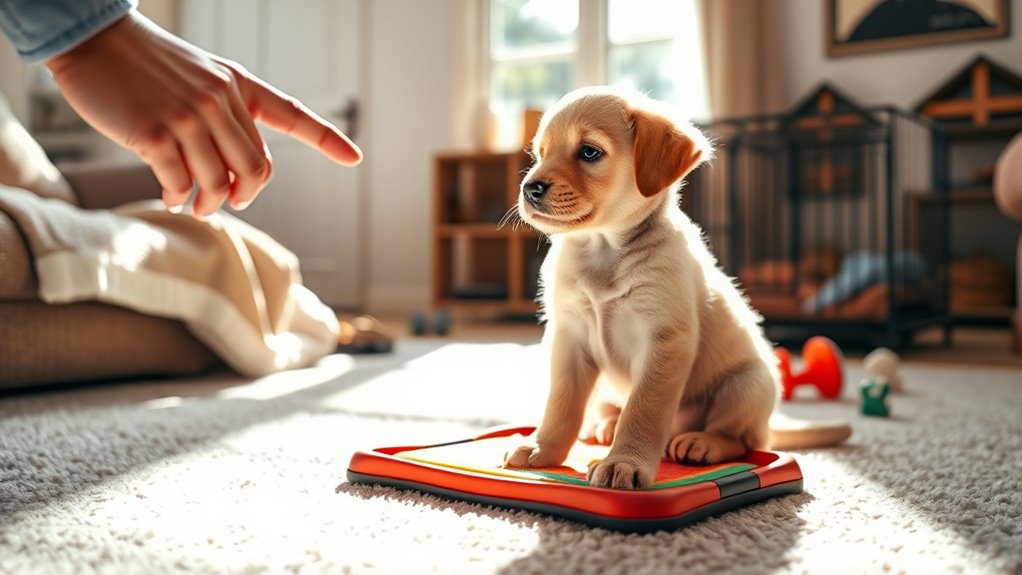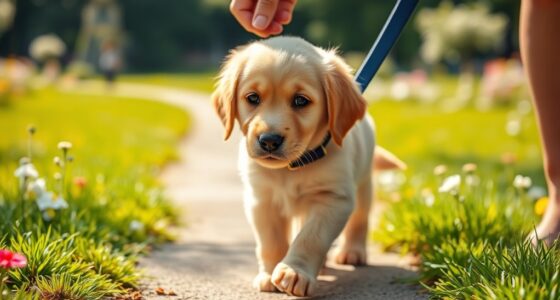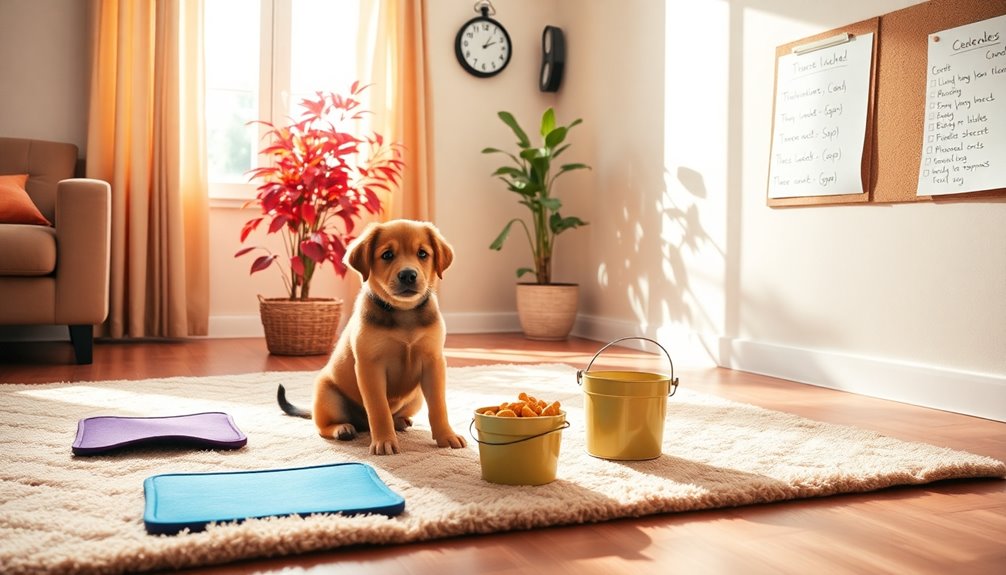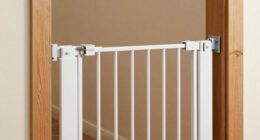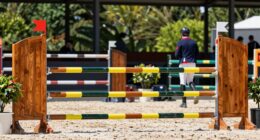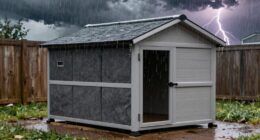To housebreak your puppy, establish a consistent routine for potty breaks and use a crate as a cozy, safe space that encourages good habits. Make the crate inviting with soft bedding, and always praise outside potty success. Catch accidents early and clean thoroughly to remove scents. Patience and positive reinforcement are key. If you keep up with these steps, you’ll soon see progress—more helpful tips await to make the process smoother.
Key Takeaways
- Establish a consistent potty schedule and designated outdoor areas for your puppy.
- Use a properly sized crate to provide a safe space and promote bladder control.
- Reward and praise your puppy immediately after successful outdoor eliminations.
- Monitor your puppy closely to catch accidents early and prevent indoor messes.
- Be patient, persistent, and avoid punishment to encourage successful housebreaking.
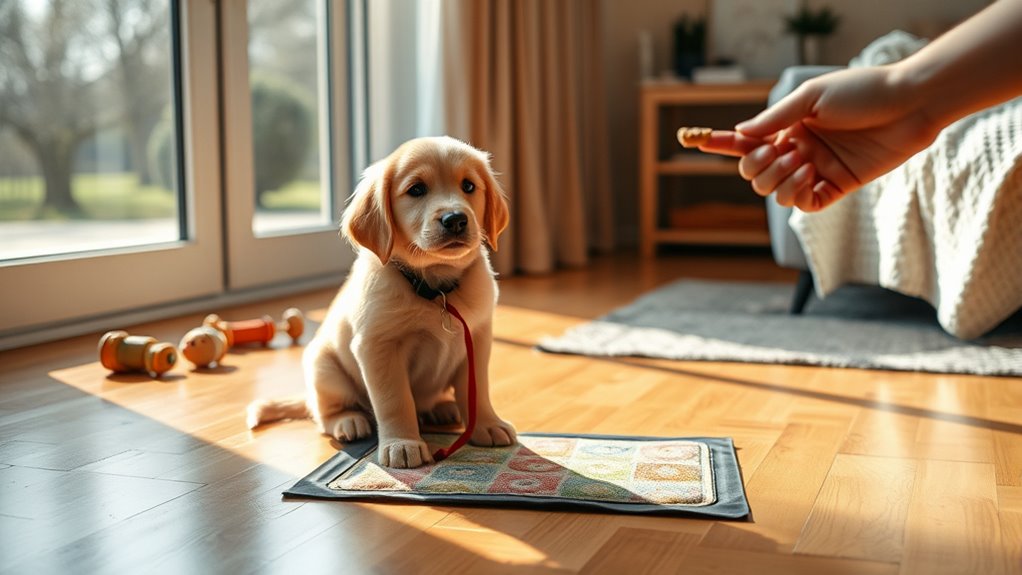
Have you ever wondered how to successfully housebreak your new puppy or dog? One of the most effective methods is crate training. Crate training provides your puppy with a safe, den-like space where they feel secure, making it easier for them to learn bladder and bowel control. When you start crate training, choose a crate that’s just the right size—big enough for your puppy to stand, turn around, and lie down comfortably, but not so large that they have plenty of extra space to eliminate in one corner. This setup encourages your puppy to hold their pee and poop until you let them out, reinforcing good habits early on.
Crate size matters: just enough room for your puppy to stand, turn, and lie down comfortably.
To begin, introduce the crate gradually. Make it inviting by placing soft bedding and some toys inside. Encourage your puppy to explore the crate at their own pace, using treats and praise to create positive associations. Keep initial sessions short and sweet, gradually increasing the time they spend inside. Never use the crate as punishment; instead, see it as a cozy retreat. When your puppy is comfortable, start establishing a routine—take them outside to their designated potty area at regular intervals, especially after eating, playing, or waking up. Consistency is key here because it helps your puppy understand when and where they should go.
Accidents are inevitable during housebreaking, but how you handle puppy accidents is essential. If you catch your puppy in the act indoors, calmly interrupt and immediately take them outside to their potty spot. Avoid yelling or punishing—puppies don’t understand punishment; they only associate negative feelings with being corrected, which can create fear or confusion. If you find an accident after it happened, clean the area thoroughly with an enzymatic cleaner to remove the scent, so your puppy isn’t tempted to go there again. Never rub your puppy’s nose in the mess or physically punish them; such actions can damage your relationship and hinder progress. Instead, focus on reinforcing positive behaviors by praising your puppy when they go outside, making it clear that going potty outdoors is what you want.
Furthermore, understanding your puppy’s personality traits can help tailor your housebreaking approach and improve your training success. Consistency, patience, and positive reinforcement are your best tools during housebreaking. Crate training helps manage your puppy’s environment and reduces accidents indoors, while clear routines and gentle correction of puppy accidents help your little one learn faster. Remember, housebreaking isn’t a quick fix; it takes time and effort. Celebrate small successes along the way, and stay committed to your routine. With patience and persistence, your puppy will soon associate outdoor pottying with praise and comfort, making the process smoother for both of you.

EliteField 3-Door Folding Soft Dog Crate with Carrying Bag and Fleece Bed (2 Year Warranty), Indoor & Outdoor Pet Home (24" L x 18" W x 21" H, Gray)
This 24" soft crate measures 24" long x 18" wide x 21" high, which is 2" wider and…
As an affiliate, we earn on qualifying purchases.
As an affiliate, we earn on qualifying purchases.
Frequently Asked Questions
How Long Does Housebreaking Typically Take?
Housebreaking usually takes about 4 to 6 weeks, but it varies with your puppy’s consistency and age. You should use crate training to provide a safe space and establish routine. Implement reward systems to reinforce good behavior, praising or rewarding your pup when they go outside. Stay patient and consistent, as some puppies may take longer. With dedication, your puppy will learn proper potty habits more quickly.
What if My Puppy Keeps Having Accidents?
Imagine you’re in the 1920s, and your puppy keeps having accidents. Don’t panic! Stick to crate training and maintain consistency tips, like taking your pup out frequently and praising successes. If accidents happen, calmly clean without punishment. Keep a regular schedule and watch for signs they need to go. Patience is key—eventually, your puppy will learn where they’re supposed to go, even if it takes a little extra time.
Can Older Dogs Be Housebroken?
Yes, older dogs can be housebroken. With patience and consistent senior dog training, you can successfully teach your dog new habits. Incorporate crate training benefits, like helping your dog learn boundaries and reduce accidents. Regular potty schedules and positive reinforcement make the process smoother. Remember, older dogs may take longer, but with persistence, you’ll see progress and enjoy a well-trained, happy companion.
What Are Signs My Puppy Is Ready to Be Trained?
When your puppy starts showing signs of readiness, it’s like opening a door to new adventures. Look for signs of puppy maturity, such as alertness and interest in training cues. If they’re consistently going potty outside, waking up dry, or following commands, it’s a good time to start training. These cues indicate they’re ready to learn, making housebreaking smoother and more successful.
How Do I Prevent My Puppy From Developing Bad Habits?
You can prevent bad habits by using positive reinforcement to reward good behavior and crate training to set boundaries. When your puppy does something right, praise or treat them immediately. Keep crate time consistent to create a safe space, which helps them learn bladder control and reduces accidents. Avoid punishment, and instead, focus on guiding them gently. This approach encourages good habits and discourages undesirable behaviors effectively.

Nature’s Miracle Advanced Stain and Odor Eliminator Dog Spray, Fresh Scent, Severe Mess Enzymatic Formula for Tough Pet Messes, 32 Ounces,red
FOR SEVERE DOG MESSES: Powerful enzymatic formula works to eliminate tough stains and odors from dog urine, diarrhea,…
As an affiliate, we earn on qualifying purchases.
As an affiliate, we earn on qualifying purchases.
Conclusion
Now that you’ve learned the essential steps to housebreak your puppy, you’re almost there. But remember, patience and consistency are your best friends—one mistake doesn’t mean failure. Keep reinforcing good habits, and your puppy will soon surprise you with their progress. Yet, even as they learn, unexpected challenges may arise. Are you prepared for the surprises ahead? Stay committed, and you’ll soon enjoy the reward of a well-trained, happy puppy by your side.

Amazon Basics Leak-Proof Dog and Puppy Potty Training Pee Pads with Quick-Dry 5-Layer Super Absorbent Surface for Dog Training, Floor Protection, Regular Size 22×22", Blue & White, 50 Count
INCLUDES: 50 Regular-size standard-absorbency puppy pee pads; ideal for puppy training, senior dogs, car trips, and more
As an affiliate, we earn on qualifying purchases.
As an affiliate, we earn on qualifying purchases.

Sweetcrispy 30 Inch Single Door Dog Crate, Metal Pet Kennel with Secure Lock, Foldable Design, Removable Tray for Easy Cleaning, Portable Puppy Cage for Small Dogs, Ideal for Training & Travel
Durable Metal Construction: Crafted with high-quality iron, the dog crate ensures strength and durability, providing a secure space…
As an affiliate, we earn on qualifying purchases.
As an affiliate, we earn on qualifying purchases.

